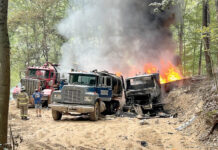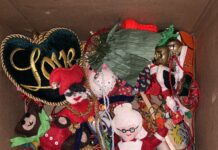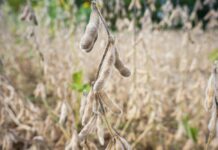DANVILLE, Ohio — After nearly a half-century in the turkey business, the Hawk family of Ohio’s Knox County found themselves in an uncomfortable position. Local processing plants were gradually closing and when a plant in Zeeland, Mich., closed in 1998, the family began looking for a new venture.
Don and Janet Hawk, along with their son, Delbert, run Skyline Turkey Farm along Skyline Road west of Danville. Don’s parents, Robert and Frances Hawk, raised turkeys from 1946 until 1960, and Don took over the business in 1962, at one time raising as many as 50,000 turkeys a year.
Today, they still raise about 8,000 head of turkeys, but have converted two of their turkey barns to raise an additional 3,500 head of sheep.
They also raise about 50 head of beef cows and 50 or so head of beef calves. They farm about 600 acres of row crops, and several more acres of hay and pasture.
It’s what’s often called “diversified agriculture,” a concept more popular in the early and mid-1900s, but one that has made a welcome return to the Hawk farm.
Getting started
Don Hawk raised his first large group of turkeys when he was a junior in high school. He started with 5,000 turkeys that summer and finished them just before Thanksgiving. He paid back the feed bill with the check and when everything was paid, he still had some left.
“I had money left to buy a new car and that changed my whole attitude about raising turkeys,” he said.
Hawk would continue in the turkey business, earning his state FFA degree with turkeys and other livestock, and eventually helping to make Knox County one of the largest turkey-producing counties east of the Mississippi River.
In the late 1960s, his brother, Ron, owned a feed facility presently known as Danville Feed & Supply. Together, the family and about nine other area turkey growers were feeding about half a million turkeys.
In 1971, Don married Janet, who had grown up on a farm near Zanesville. They adopted four children and all continued to raise turkeys until the market changed and local processors shut down.
“When processing closed down, there was no place to go with them,” Don Hawk said.
Big decision
He was left with two large barns — one that was more than 350 feet long. He considered raising dairy heifers, but ultimately decided on a smaller and more manageable animal: lambs.
The turkey barns were remodeled with pens and feeders, and first two groups of lambs arrived in September and October of 1998, totaling 700 in all.
Don said the transition was partly easy, and partly difficult.
“When you deal with livestock, there’s a lot of similarities,” he said.
He found the biosecurity and health concerns to be similar, and the family had acquired some experience with sheep through 4-H. Delbert, now 34, used his 4-H money from turkeys and other projects to buy 10 ewe lambs from a neighbor.
By time Delbert was senior in high school, he had 40 ewes and the family knew they were onto something.
“We knew we could do it,” Don said. “Not that we know it all, but we had some exposure to it.”
The Hawks buy lambs ranging 50-80 pounds and finish them at 135-140 pounds. It’s a larger lamb than some of the roaster lambs, but it’s what their market demands. About 50-80 lambs are pulled each week and sent for processing in Pennsylvania, and typically end up in high-end, white table cloth meals, Don said.
Lots of work
On a typical day, Don heads for the turkey barn in the morning to check their condition, and hand feeds hay to the sheep twice a day. Janet handles book work, cooks for the family, gardens and spends time with their grandchildren. All of the sheep are kept inside.
“It’s a way of life, not just a job,” Don said. “A livestock producer knows animals eat seven days a week, 365 days out of the year. Whether it’s Christmas or New Year’s or Easter or whatever, you still have your chores to do.”
Things can get pretty busy having so many animals, and different kinds of animals, Don and Janet both said. But, the diversity helps to add security.
“It keeps you busy all the time,” she said. “Things have to fall in line and work together.”
The Hawks were awarded the Charles Boyles Master Shepherd Award in December by the Ohio Sheep Improvement Association. Don said it was a surprise, because other producers have been raising sheep all their lives and have more experience.
Good sense
But Don prefers the diversity, because it helps provide a source of income year-round. When he only raised turkeys, they were seasonal and so was the money. He found himself working off the farm with an electrician, a plumber, and even helping tool dress on an oil rig.
Aside from the livestock and crops, Don has found a niche in the local community, where he coordinated the most recent expansion of the Knox County Agricultural Museum. And, he recently coordinated a charitable project in town, where a new building was constructed for the Danville Branch of Innerchurch.
He and Janet both admit to no expertise when it comes to building or remodeling. But, just as they’ve done in farming, they’ve learned to identify what needs done and seek the appropriate help.
“I don’t claim to know everything,” he said. “I know what might need to be done, (then) I’ll get somebody who has the expertise.”









